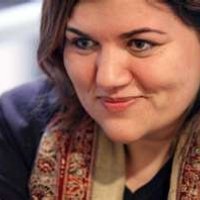The Woodrow Wilson International Center for Scholars is pleased to announce that Dr. Angela Kocze will receive the 2013 Ion Ratiu Democracy Award. Dr. Angela Kocze, a leading Hungarian Roma rights activist and scholar, is currently a Visiting Assistant Professor with the Department of Sociology at Wake Forest University in North Carolina, as well as a Research Fellow at the Hungarian Academy of Sciences.
Dr. Kocze has an international reputation for interdisciplinary approach, combining political activism and policy-making with in-depth participatory research studies on the Roma situation in Hungary and elsewhere. Dr. Kocze also worked as a founding director of the European Roma Information Office (ERIO) in Brussels (2003-2004), as well as the former director of the human rights education program at the European Roma Rights Centre (1998-2003) in Budapest. Dr. Kocze was the founding director of the Romaversitas program (1996) in Budapest which offers scholarships and mentorship for Roma minority university students.
Established in 2005, the Ion Ratiu Democracy Award (IRDA) aims to bring visibility and international recognition to the ideas, ideals and accomplishments of individuals around the world who are working on behalf of democracy. It brings recognition to the importance of the work carried out by democracy activists around the world. The event expresses the deep commitment to democracy of the late Ion Ratiu through his contributions as a Romanian politician as well as his interest in democratic change worldwide.
Previous awardees include Aung San Suu Kyi (Myanmar, 2012), Nabeel Rajab (Bahrain, 2011), Oleg Kozlovsky (Russia, 2010), Adam Michnik (Poland, 2009), Eleonora Cercavschi (Moldova, 2008), Anatoli Mikhailov (Belarus, 2007), Saad Ibrahim (Egypt, 2006), and Sergio Aguayo (Mexico, 2005).
The recipient of the award will be hosted in Washington, D.C., by the Wilson Center for up to one month to allow for broad and in-depth interaction with representatives of Washington’s policy, NGO and academic communities. The awardee will present the results of his/her experience at a workshop at the Wilson Center. The award workshop will take place on December 5, 2013.
The Award is generously supported by the Ratiu Family Foundation (London), established in 1979 by Ion Ratiu and his wife Elisabeth Ratiu, in partnership with the Ratiu Democracy Center (Turda, Romania, Ion Ratiu’s birthplace). The goals of the Foundation are to further education and research in the culture and history of Romania in particular, and also to stimulate and support civil society in its understanding and application of democracy and democratic principles the world over. Details can be found on www.ratiufamilyfoundation.com and www.ratiudemocracycenter.org.
The Woodrow Wilson International Center for Scholars, the living national memorial to President Woodrow Wilson, was established by Congress in 1968 and is headquartered in Washington, D.C. The Wilson Center provides a strictly nonpartisan space for the worlds of policymaking and scholarship to interact. By conducting relevant and timely research and promoting dialogue from all perspectives, it works to address the critical current and emerging challenges confronting the United States and the world.
For more information, please visit the IRDA website www.wilsoncenter.org/ratiu.






